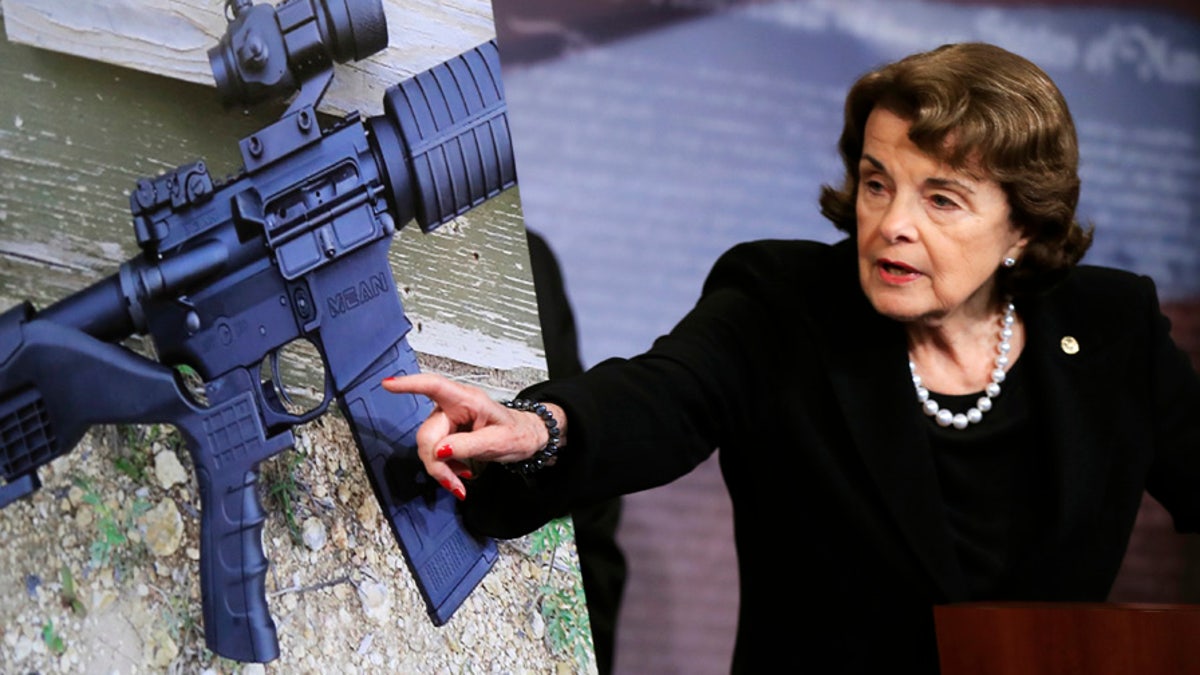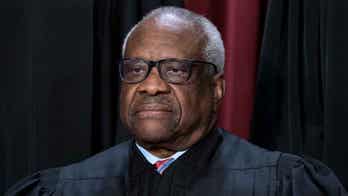
Sen. Dianne Feinstein, D-CA, said in a statement on Thursday that she would “do everything in my power to block this policy – including through the appropriations process.” (The Associated Press)
U.S. Sen. Dianne Feinstein has drawn the ire of the National Rifle Association over claims that the AR-15 – which the group calls “America’s rifle” – is not “in common use.”
In a statement Friday, the NRA's Institute for Legislative Action called into question the California Democrat's assertions about the weapon and said the rifle has gained popularity in recent years.
The group cited figures from the National Shooting Sports Foundation. The firearms industry trade group calculated that between 1996-2016 more than 16 million AR-15 and AK-pattern rifles have been available for sale in the U.S.
The gun rights group went on to accuse Feinstein of distorting facts in what it described as the senator's ongoing effort to limit Second Amendment gun rights.
“Needless to say, there is nothing 'reasonable' or moderate about banning what is literally the most popular class of rifles in America.”
“Needless to say, there is nothing 'reasonable' or moderate about banning what is literally the most popular class of rifles in America,” the NRA-ILA wrote.
Feinstein’s claim came earlier this month during the second day of confirmation proceedings for Supreme Court nominee Brett Kavanaugh. Feinstein, the ranking member of the Senate Judiciary Committee, which will determine Kavanaugh's fate, questioned him on his opinion of the constitutionality of bans on assault weapons.
“I’m talking about your statement on 'common use,' she told Kavanaugh. “Assault weapons are not in common use.”
“Semi-automatic rifles are widely possessed in the United States,” Kavanaugh rebutted. “There are millions and millions. ... That seemed to fit the [definition of] 'common use' and not being a dangerous and unusual weapon."
“Semi-automatic rifles are widely possessed in the United States. There are millions and millions. ... That seemed to fit the [definition of] 'common use.'"
Feinstein countered that the numbers of rifles in existence didn’t constitute “common use,” arguing that the term applies to how often the weapons are used.
“Common items are routinely said to be “in use” for a purpose whether or not that involves active manipulation of the item at any given time,” the NRA said.
Feinstein has been a fierce gun-control advocate since her days as on the Board of Supervisors in San Francisco.
She was the first person to discover her colleague Harvey Milk on his office floor after he'd been fatally shot, according to the Los Angeles Times. A former supervisor, Dan White, also assassinated then-Mayor George Moscone on that day in November 1978.
Since then, Feinstein has advocated for tough gun reforms.
"I have been a woman on a mission to ban assault weapons," the senator said, to applause, at a gathering of union members at the California Democratic Party convention this year. "This is not our America, and we need to change it," she said.
That hasn’t stopped her from owning firearms. Two years before the assassinations, Feinstein was trained to use a .38 five-shot revolver and obtained a concealed-carry permit.
She attempted to reenact the Clinton-era assault weapons ban in the aftermath of several high-profile mass shootings, including the Oct. 1, 2017, mass shooting in Las Vegas that left 58 people dead and hundreds injured.
The NRA called it ban-revival effort a "125-page firearm prohibition fever dream [that] is perhaps the most far-reaching gun ban ever introduced in Congress."
During the Kavanaugh hearing, Feinstein asserted that Kavanaugh's reasoning for dissenting on the District of Columbia’s assault weapons ban was “far outside the mainstream of legal thought and it surpasses the views of [the late Justice Antonin] Scalia, who was obviously a pro-gun justice.
“If the Supreme Court were to adopt your reasoning," she said to Kavanaugh, " I fear the number of victims would continue to grow.”




